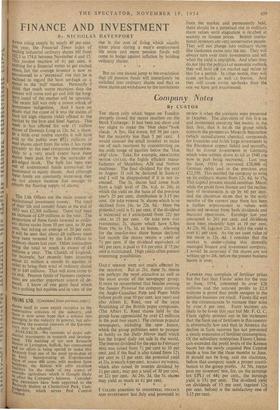FINANCE AND INVESTMENT
By NICHOLAS DAVENPORT
Arita rising steeply by nearly 40 per cent. this year, the Financial Times index of leading industrial ordinary shares fell from 182.3 to 174.6 between November 4 and 15. This modest reaction of 41 per cent. is nothing for a financial writer to get excited about, but the average investor is now so accustomed to a 'perpetual' rise that he is inclined to regard the least set-back as a threat to the ' bull' market. Personally think that much worse reactions than the Present will come and go and still the long- term trend of the market will be upwards. the recent fall was only a minor attack of investment indigestion. And 1 have no doubt that the cause of it was the excess of food (of high vitamin yield) offered to the Market by the Iron and Steel Agency. This. Week it has offered for sale 15 million shares of Dorman Long at 22s. 6d. a share. In a little over twelve months it will have sold to the public over E721 millions of steel shares apart from the sales it has made Privately to the steel companies themselves. Only to a very small extent have these shares been paid for by the surrender of gilt-edged 'stock. The bulk has been met 0, ut of institutional funds earmarked for Investment in equity shares. And although these funds are constantly increasing they do not always increase fast enough to absorb the floating supply of shares.
*
rise in the cost of living which usually takes place during a man's employment life more and more pension funds will come to hedge against inflation by holding ordinary shares.
But no one should jump to the conclusion that all pension funds will immediately be switched into ordinary shares and that as these shares are withdrawn by the institutions • from the market and permanently held, there should be a perpetual rise in ordinary share values until stagnation is reached at scarcity or famine prices. British institu- tional investors are very conservative people. They will not plunge into ordinary shares like Gadarene swine into the sea. They will always turn over their investments and sell when the yield is negligible. And when they do,not like the political or economic outlook they will hold oW the market and refuse to buy for a period. In other words, they will cause set-backs as well as booms. And they will cause worse set-backs than the one we have just experienced.










































































 Previous page
Previous page